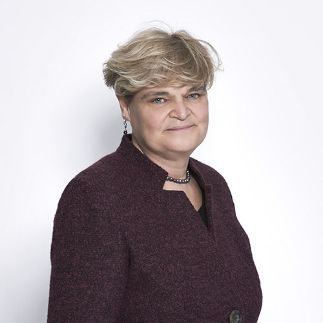Levi Sonia Maria Rosa Professore OrdinarioMedicineBIOS-10/A - Biologia cellulare e applicata
Biografia
Biografia
Present position:
Associate Professor of Biology, School of Medicine, Vita-Salute San Raffaele University and Head of the Proteomic of Iron Metabolism Unit, Division of Neuroscience, DIBIT, IRCCS-HSR .
Degree:
University of Milano-PhD in Biological Science 1982-Milano, Italy
Professional Experience:
1982/1983 Post-doctoral training – Department of Biomedical Science- University of Milano
1984 EMBO fellow- EMBL- Heidelberg- Germany
1986/1989 Post doctoral research fellow- Fondazione Centro San Raffaele del Monte Tabor- Milano- Italy
1989/1992 Researcher- Fondazione Centro San Raffaele del Monte Tabor-Milano-Italy
1992/2002 Researcher- Protein Engineering Unit, DIBIT- IRCCS San Raffaele Milano-Italy
Since 2003 Head of the Unit “Proteomic of Iron Metabolism”, Division of Neuroscience- IRCCS San Raffaele, Milano-Italy
Since 2005- Associate Professor of Biology, School of Medicine, Vita-Salute San Raffaele University, Milano, Italy
Teaching activity:
- Coordinator of two integrate courses: “Experimental and Molecular Techniques” and “Experimental Cell Biology and Bioimaging” for the degree course in Medical and Pharmaceutical Biotechnology
- Coordinator of 5 laboratory practical courses for the degree course in Medical and Pharmaceutical Biotechnology
- Tutor of the first year of the course in Medical and Pharmaceutical Biotechnology
Research duties:
- 1998-2001, contractor for a “Ricerca Finalizzata IRCCS” project: “Basi molecolari e diagnostica genetica di nuovi disordini del metabolismo del ferro”
- 2001, Contractor for a ”CNR-Agenzia2000” project .“Caratterizzazione funzionale di una nuova ferritina mitocondriale umana”
- 2001-2004, P.I. of Telethon project: “Characterization of the newly discovered mitochondrial ferritin: implications for Friedreich’s ataxia, sideroblastic anemia and disorders with mitochondrial iron loading.”
- 2002-2006, FIRB-MIUR, Contractor for the project “Post-genomica del metabolismodel ferro.”
- 2003-2005 – Fondazione Mariani, Unit of the project: “ Study the role of frataxin and ferritin in mitochondrial iron metabolism aimed at the development of new therapeutic approaches of Fridreich’s ataxia”. P.I. Prof. Paolo Arosio
- 2005-2008- P.I. of Telethon multicentric project. “Functional and epidemiological study of neuroferritinopathies: implications for the role of iron in neurodegenerative disorders”
- 2007-2009- PRIN 2006-MIUR, Unit of the project “Characterization of new animal and cellular models for the study of disorders of iron homeostasis: the role of mitochondria and of heme metabolism.” P.I. Prof. Paolo Arosio
- 2008-2010: Cariplo 2007- Unit of the project: “Engineered Animal And Cellular Models To Dissect The Mechanisms Of In Vivo Homing And Differentiation Of Pluripotent Stem Cells”, P. I. Prof. Ruggero Pardi
- 2010-2013- P.I. of Telethon multicentric project. “Animal models of neuroferritinopathies for the study of the role of iron in neurodegeneration, P.I. Prof. Paolo Arosio
- 2011-2012: AISNAF-PI of project: “Analisi del ruolo del ferro nella PKAN mediante lo sviluppo di nuovi modelli cellulari neuronali”
- 2011-2014: Coordinator of Telethon multicentric project: “The role of iron and mitochondria in the pathogenesis of Pantothenate Kinase Associated Neurodegeneration (PKAN): development of new neuronal cellular systems and analysis of a mouse model.”
- 2014-2017: AISNAF-PI of project “Generation of induced pluripotent stem cells from patients’ fibroblasts with different mutated genes causing NBIA”.
Reviewer:
Antioxidants & Redox Signaling, Biochimica et Biophysica Acta, BLOOD, Comparative Biochemistry and Physiology, Free Radical Biology and Medicine, Haematologica, Neurobiology of Aging, etc.
Referee for:
MIUR; US-Israel Binational Science Foundation, Israel; BBRSC- United Kingdom; India Alliance, Wellcome trust
Membership:
Italian Society of Biology and Genetics, European Iron Club, International BioIron Society
Organization activity:
Since 2001 she directs a Research Unit of the Scientific Institute San Raffaele
Since 2003 she is a member of the CAP (Commission for Appoint and Promotion), San Raffaele Scientific Institute
She has contributed to the organization of national and international conferences:
1986 -European Iron Club , Pavia (Member of the Scientific Committee)
1994 – European Iron Club, Gargnano del Garda (BS) (Organizer and member of the Scientific Committee)
1999 – Bioiron’99 , World Congress on Iron Metabolism, Sorrento, Naples, (Organizer and member of the Scientific Committee)
2014 – ” New frontiers in neuroacanthocytosis and neurodegeneration with brain iron accumulation “, Stresa (Organizer and member of the Scientific Committee)
Scientific Production:
Sonia Levi is co- author of 111 articles (for a total of 551.837 Impact Factor , IF average of 4,971 and an h-index of 52) , and numerous book chapters.
The publications are related to the research carried out on the following topics:
- Structure, function and immunology of natural ferritins.
- Production and characterization of recombinant human ferritins and mutants.
- Studies on the biological function of ferritins.
- Studies of the unfolding and refolding of the ferritins.
- The ferritin receptor.
- Production of K.O. mice for the H-ferritin gene.
- Studies on the HFE, IRP1, ferroportin, GLRX5 proteins.
- Identification of gene mutations associated with disorders of iron metabolism.
- Disorders of iron metabolism.
- Production and characterization of cellular models of Neuroferritinopathy.
- Characterization of cellular models of neurodegeneration associated with defects in pantothenate kinase 2 gene.
- Production and characterization of recombinant allergens.
Il titolare del presente curriculum vitae, pubblicato online sul portale www.unisr.it, è garante in via esclusiva della correttezza e della veridicità dei dati e delle informazioni in esso riportate e del loro eventuale e puntuale aggiornamento. Egli è dunque il diretto ed unico responsabile dei contenuti indicati nei propri curricula.

